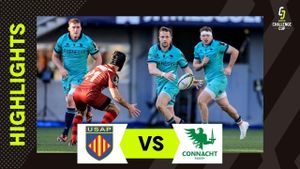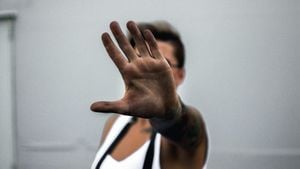Germany's prestigious DFB-Pokal has reached its quarterfinal stage with thrilling matchups drawn from the hat at the German Football Museum in Dortmund. The standout fixture sees SV Werder Bremen, after a hard-fought cup run, face off against the only remaining third-division club, Arminia Bielefeld.
The draw took place on Sunday afternoon, where handball national player Julian Köster pulled the names from the bowl, ensuring some electrifying encounters are on the horizon. For Werder Bremen, it’s seen as both fortunate and promising. They have drawn the Ostwestfalen, last perceived as underdogs after their surprising victory over Bundesliga team SC Freiburg, winning 3-1 to reach this round. "Wir sind einfach sehr, sehr happy, dass wir in der nächsten Runde sind," said coach Ole Werner, expressing the team's relief and excitement about advancing. The matches are scheduled to take place on February 4-5 and 25-26, 2025.
Arminia Bielefeld, buoyed by their unexpected success, is eager to capitalize on their home advantage. "Mit dem SV Werder Bremen bekommen wir ein sehr attraktives Los. Wir nehmen die Herausforderung an," stated Michael Mutzel, the club's sports managing director, excited about facing such storied opponents. This match could be pivotal for Bielefeld as they seek to break through to the semifinals, having already demonstrated their capability of defeating top teams.
Other matches drawn included RB Leipzig squaring off against VfL Wolfsburg, as well as VfB Stuttgart hosting FC Augsburg. The quarterfinals promise to be full of action and drama, with each team vying for the opportunity to take home not just pride but also the significant financial backing for advancing within the tournament.
The tournament's stakes couldn't be higher with 3.3 million euros awaiting the teams reaching the semifinals. The DFB-Pokal not only offers substantial prize money but also the chance for teams to claim the iconic title.
Match preparations and ticket sales will be ramping up swiftly. Both home clubs, particularly Arminia, are excited about the influx of fans, especially as Werder traditionally brings large numbers. "Wir haben in den vorherigen Runden gezeigt, dass wir unangenehm zu bespielen sind," noted Mitch Kniat, the coach of Bielefeld, emphasizing their readiness to take on the challenges. They have shown resilience and skill throughout the competition, besting both Hannover 96 and Union Berlin to make their way through.
The match-ups scheduled for February will allow both leagues and clubs to showcase their talents. The Bundesligen will be fielding substantial teams, but the allure of the DFB-Pokal is enhanced by the inclusion of teams from lower divisions giving it unpredictability and excitement.
Supporters will eagerly await the quarterfinal matches with anticipation, sharing their hopes and predictions on the league dynamics. Each team has its narratives, history, and motivations as players and fans alike dream of catching the golden ticket to Berlin.
With the draw completed, the focus shifts to the strategies and training as clubs prepare for what's undoubtedly going to be tense and captivating encounters. The prospects of upsets, jubilant celebrations, and heartbreaking exits make the DFB-Pokal a tournament worthy of following.
One thing is certain: every team involved will fight valiant battles, and it is anyone’s guess as to who will emerge victorious and how each match will shape the future of German football.
Fans can look forward to intense competition as the teams take to the pitch, making their mark and perhaps creating memorable moments along the way. The quarterfinal stage will not only determine who advances but also solidify the legacies of the players and clubs involved.



